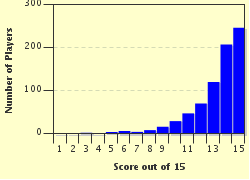Quiz Answer Key and Fun Facts
1. The mid-1500s were a turbulent time in France, with widespread discontent. In 1562, a powerful duke used his personal army to put down a rebellion at the massacre of Vassy. The bloody suppression of this rebellion would plunge France into internecine warfare for the next thirty six years. Tell me, what were these people fighting about? (Hint: think 95 Theses)
2. After Henry IV ascended the throne, the mid-16th century turbulence which had racked France gradually died down; during his reign he issued a marvelously progressive ruling for its time, the Edict of Nantes (1598). This same Henry IV was the founder of a dynasty which lasted all the way up to the French Revolution in 1789. What was the name of this dynasty?
3. In 1618 a major war broke out in Europe. Ostensibly Catholic vs. Protestant, it degenerated into a mad bloody grab for power and land. Catholic France decided to enter the war on the mainly Protestant side to break the hegemony of the Habsburg Holy Roman Emperor. Thirty years later... peace! What was the name of this highly destructive war? (Don't think too hard on this one.)
4. I reigned from 1643 to 1715, the longest-reigning European king. I moved the French Royal Court from Paris to Versailles, and history calls me the "Sun King." Not everyone thought I was so "sunny," however, for I also revoked the Edict of Nantes, halting official religious toleration. Who was I?
5. This next event in French history was a pivotal moment in the history of Europe, for it had the crowned heads of Europe united against it. In contrast, young poets and idealists everywhere felt differently. William Wordsworth (1770-1850) said this: "Bliss was it in that dawn to be alive, but to be young was very heaven!" (Wordsworth eventually got disillusioned.) What was this event which started in 1789?
6. The French event which at first thrilled Wordsworth and other Romantics lasted from 1789 to 1799. During that time, new institutions and customs were brought to France: a ten-day week, abolition of religious orders, the metric system and a new slogan which the people embraced. This slogan was "Liberty, Equality and _______________." What was the third word of this revolutionary motto?
7. By 1799, the First French Republic was basically dead. One man, Corsican by birth, rumored to be short, and buoyed by earlier military successes, made history when he declared himself First Consul of France. In 1804 he declared himself Emperor. Who was this man whom the world calls by his first name even today? (Hand-inside-his coat?)
8. "Mr. Rumored-to-be-short-with-hand-inside-his-coat" was in trouble in March 1814 when the Allies captured Paris. After he had wreaked so much havoc in continental Europe, the Allies decided they had had enough of "Boney" as the Brits called him. What did they do with this guy?
9. With "Boney" gone, the victorious Allies decided to "let bygones be bygones," and to allow the First French republic to stand. They then monitored a democratic election for the French people to choose whichever form of government they preferred.
10. Fifteen years after the Bourbons returned, revolution was in the air again. In 1830 a new king was crowned, known as "the bourgeois king," who was liked by the wealthy middle classes. He was swept in on this revolution and swept out by another, a major revolution in 1848 which rocked Europe. Who was this king?
11. The revolution of 1848 brought some hope to the poorer classes in France, and a new champion emerged to establish the Second French Republic. In 1851, however, he betrayed this new-found hope when he overthrew his own republic and declared himself Emperor. He was nephew to the First Emperor of the French. Who was this man?
12. In 1870, the French were fearful that a German might be allowed to inherit the Spanish throne. Even though the candidacy was withdrawn, the French demanded further concessions from Prussia, which were exaggerated to the German press by Prussian Chancellor Bismarck. Of course, this meant war! What was this war called and who won?
13. When World War I ended in 1918, 15 million were dead and 20 million were wounded. Final reports say the Allies lost around 6 million soldiers and the Central Powers around 4 million. Of the USA, France, UK (British Isles alone) and Canada, which country suffered the most military deaths in World War I?
14. This region in Northern Africa, once part of the Barbary States, was made a colony of France in 1830. Thousands of French moved here, but never quite assimilated with the indigenous Muslim population which was never allowed full political democracy. A bloody war of insurrection was fought here from 1954 to 1962. What is the name of this country? (Hint: its main port and its country name are similar; Camus was born here.)
15. In 1962, Charles de Gaulle became the first French head of state since Napoleon to make an official state visit to Germany.
Source: Author
snediger
This quiz was reviewed by FunTrivia editor
bloomsby before going online.
Any errors found in FunTrivia content are routinely corrected through our feedback system.

